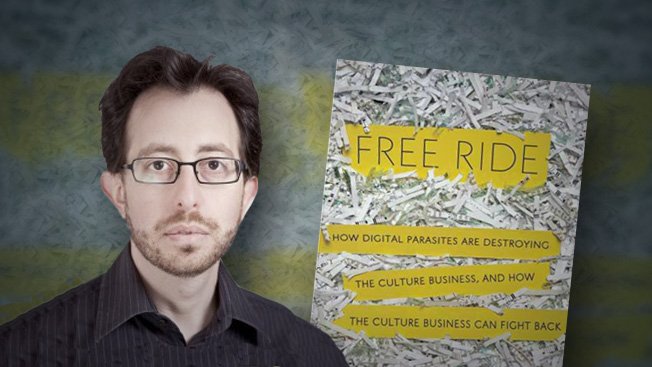Is Robert Levine a Hypocrite?
Robert Levine wrote an August 14th, 2011 opinion piece for The Guardian (based on his own limited view of the future and some convenient half-truths) that argues that the Internet is "simply too chaotic to provide the infrastructure for a 21st-century economy."
There are many blindspots in Mr. Levine's counter-revolutionary screed.
For starters, it might be worth noting that Mr. Levine's Guardian article is (by his own design?) being spread for free on the Internet. Perhaps Mr. Levine is upset by this. But perhaps he also understands that he has become a celebrity thanks to the Internet. Online publicity is central to the sales of his awful book. If he understands that sales of his lump of paper and ink depend on aspects of the Internet that he decries, isn't Mr. Levine a hypocrite?
Mr. Levine wants to sound knowledgeable about the cost of making and distributing a motion picture on film versus production using cheap digital tools and distribution online. In a stunning bit of rhetorical hocus-pocus, Mr. Levine minimizes the importance of the Internet to film production: "It's hard to imagine" how the cost of producing motion pictures will plummet (as it has for distribution online v theatrical prints) "because the internet hasn't had nearly as much effect on the process of making movies."
Notice how Mr. Levine's argument about motion picture costs starts with the assumption that we all are as limited in imagination as Mr. Levine himself (hard for Mr. Levine to imagine cheaper production than Hollywood perhaps).
Mr. Levine's argument about the movies also requires that we accept Hollywood as the only model for film production. The affect of the Internet on motion picture production by Hollywood standards might indeed (so far) be small - but Mr. Levine completely ignores the revolution in motion picture production that now includes millions of user-generated films online. Yes these new cheap online films - where production costs have in fact plummeted - are often crude and short. YouTube only went online in 2005. We are just 6 years into the new paradigm. Would it have been wise or fair to judge the potential of studio motion pictures by the quality or length of films being made in 1900?
The shift from 6 gatekeeper studios to millions of new filmmakers - making and posting a tidal wave of motion pictures each year - all without permission - involves an enormous cultural realignment that cannot be undone or ignored.
And to suggest that the old way cannot become less expensive because Hollywood continues to spend millions on producing awful sequels is a bit like arguing that Gutenberg should have been stopped circa 1439 because monks can only hand illustrate manuscripts so quickly.
I could go on...
If you think, as Mr. Levine apparently does, that YouTube's use of clips from NBC's Saturday Night Live is what built YouTube into a business that Google bought for $1.65b just 18 months after YouTube launched, then there's a bridge in Brooklyn I'd like to sell you.
In 1775 Mr. Levine's argument would have boiled down to this: If we overthrow the British, where will the new spinning jenney or Encyclopaedia Britannica come from?
Mr. Levine is outraged that expression is circulated for free online in clear violation of the old copyright law - while exploiting that amazing free exchange of ideas online to sell his book. If he's really so committed to the Old World of copyright, then why is he (cynically?) using the "chaotic" New World tools to make money?
Subscribe to:
Post Comments (Atom)
Randy Finch's Film Blog:
Thoughts from a film producer about making and distributing films.

No comments:
Post a Comment